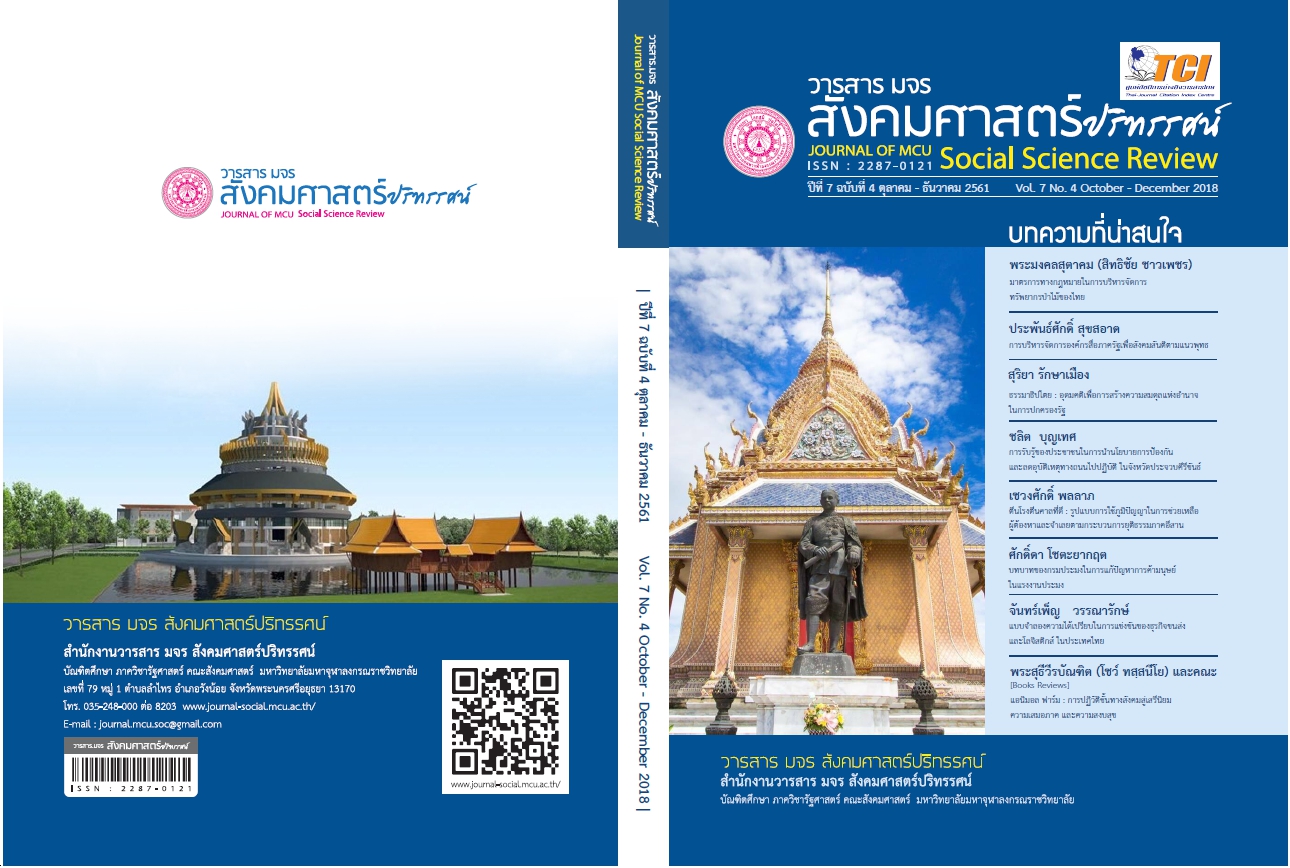ศึกษาวิเคราะห์ความสาคัญของจักกวัตติสูตร
คำสำคัญ:
จักกวัตติสูตร, การศึกษาวิเคราะห์, ความสำคัญบทคัดย่อ
บทความนี้ มีวัตถุประสงค์ 3 ประการ คือ 1) เพื่อศึกษาโครงสร้างเนื้อหาของจักกวัตติสูตร 2) เพื่อศึกษาหลักธรรมที่ปรากฏในจักกวัตติสูตร และ 3) เพื่อศึกษาวิเคราะห์ความสำคัญของจักกวัตติสูตร โดยศึกษาข้อมูลจากคัมภีร์พระไตรปิฎกและเอกสารที่เกี่ยวข้อง
ผลการศึกษาพบว่า
จักกวัตติสูตรเป็นพระสูตรว่าด้วยเรื่องพระเจ้าจักรพรรดิ พระสูตรนี้ พระผู้มีพระภาคทรงแสดง แก่ภิกษุและชาวเมืองมาตุลาขณะประทับอยู่ที่เมืองมาตุลา แคว้นมคธ โดยแบ่งโครงสร้างออกเป็น 3 ส่วน คือ 1) ภาคอุทเทศ เป็นบทเริ่มต้นที่พระผู้มีพระภาคเจ้าทรงตรัสสอนให้ภิกษุทั้งหลายพึ่งธรรม พึ่งตนเอง โดย การเจริญสติปัฏฐาน 4 2) ภาคนิทเทส เป็นบทที่อธิบายเนื้อเรื่องที่พระองค์ทรงสาธกนิทานทั้งในอดีตและอนาคตมาเป็นบุคลาธิษฐานเพื่อสอนพระภิกษุ และท้ายของภาคนิทเทสตรัสถึงพระศรีอริยเมตไตรย และ 3) ภาคนิคมน์ เป็นการบทสรุปในการตรัสพระสูตรนี้ ว่าผู้ปฏิบัติธรรมย่อมเจริญด้วยอายุ วรรณะ สุขะ โภคะ และพละ เมื่อกล่าวโดยสรุปแล้ว พระสูตรนี้มีวัตถุประสงค์เพื่อ 1) แสดงวิธีบรรลุเป้าหมายสูงสุดในทางพระพุทธศาสนาด้วยการทำตนให้เป็นที่พึ่ง และ 2) วิธีการปกครองโดยใช้หลักจักรวรรดิวัตร 12 ประการ เพื่อใช้แก้ปัญหาของสังคมใน 3 ระดับคือ (1) ระดับปัจเจกบุคคล (2) ระดับสังคมครอบครัว และ (3) ระดับสังคมโดยรวม
ส่วนหลักธรรมในจักกวัตติสูตร ได้แก่ (1) สติปัฏฐาน ธรรมอันเป็นที่พึ่ง (2) จักรวรรดิวัตร วัตรปฏิบัติของนักปกครอง (3) ศีล หลักควบคุมพฤติกรรมมนุษย์ (4) กรรม ผลของการกระทำ (5) อิทธิบาท ธรรมที่ทำให้อายุยืน (6) คุณเครื่องความเป็นสมณะ ธรรมที่ทำให้มีวรรณะ (7) ฌาน ธรรมที่ทำให้มีความสุข (8) อัปปมัญญา ธรรมที่ทำให้มีโภคะ และ (9) วิมุตติ ธรรมอันเป็นเครื่องเพิ่มกำลังให้ภิกษุผู้บำเพ็ญเพียร ซึ่งหลักธรรมทั้ง 9 ประการดังกล่าวนั้น เป็นเสมือนองค์ประกอบที่ช่วยส่งเสริม สนับสนุนกันและกันให้เข้าถึงจุดหมายสูงสุดทั้งที่เป็นโลกิยะคือความเป็นพระเจ้าจักรพรรดิราช และจุดหมายสูงสุดที่เป็นโลกุตตระ คือพระนิพพาน
จากการศึกษาความสำคัญของจักกวัตติสูตรนั้น พบว่า จักกวัตติสูตรนั้น ต้องการเสนอหลักการพัฒนาคุณภาพชีวิตด้วยวิธีการพึ่งตนเองโดยใช้สติปัฏฐาน 4 เป็นเครื่องนำ และการใช้ระบบการปกครองแบบธรรมาธิปไตยคือถือธรรมเป็นใหญ่ อาศัยหลักธรรมให้ความคุ้มครองอันเป็นธรรมแก่มนุษย์และสัตว์ ทำคนไม่มีทรัพย์ให้มีทรัพย์ และส่งเสริมศีลธรรม โดยทรงยึดหลักกุศลกรรมบถ 10 และยกหลักศีล 5 มาใช้ในระบบการปกครอง ทำให้ประชาชนตั้งตนไว้ชอบ มีการดำรงชีพด้วยความเกื้อหนุนกัน ให้มีกระบวนการคบหาสัตบุรุษ คือจัดระบบการศึกษาที่ดี และการทำให้ประชาชนได้มีโอกาสทำความดี
ดาวน์โหลด
เผยแพร่แล้ว
รูปแบบการอ้างอิง
ฉบับ
ประเภทบทความ
สัญญาอนุญาต
ลิขสิทธิ์ (c) 2019 วารสาร มจร สังคมศาสตร์ปริทรรศน์

อนุญาตภายใต้เงื่อนไข Creative Commons Attribution-NonCommercial-NoDerivatives 4.0 International License.
เพื่อให้เป็นไปตามกฎหมายลิขสิทธิ์ ผู้นิพนธ์ทุกท่านต้องลงลายมือชื่อในแบบฟอร์มใบมอบลิขสิทธิ์บทความให้แก่วารสารฯ พร้อมกับบทความต้นฉบับที่ได้แก้ไขครั้งสุดท้าย นอกจากนี้ ผู้นิพนธ์ทุกท่านต้องยืนยันว่าบทความต้นฉบับที่ส่งมาตีพิมพ์นั้น ได้ส่งมาตีพิมพ์เฉพาะในวารสาร มจร สังคมศาสตร์ปริทรรศน์ เพียงแห่งเดียวเท่านั้น หากมีการใช้ภาพหรือตารางหรือเนื้อหาอื่นๆ ของผู้นิพนธ์อื่นที่ปรากฏในสิ่งตีพิมพ์อื่นมาแล้ว ผู้นิพนธ์ต้องขออนุญาตเจ้าของลิขสิทธิ์ก่อน พร้อมทั้งแสดงหนังสือที่ได้รับการยินยอมต่อบรรณาธิการ ก่อนที่บทความจะได้รับการตีพิมพ์ หากไม่เป็นไปตามข้อกำหนดเบื้องต้น ทางวารสารจะถอดบทความของท่านออกโดยไม่มีข้อยกเว้นใดๆ ทั้งสิ้น





